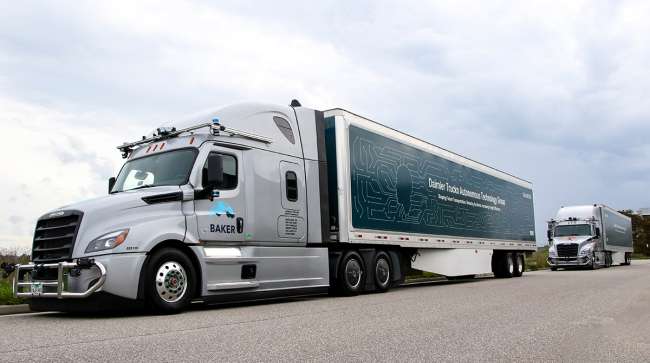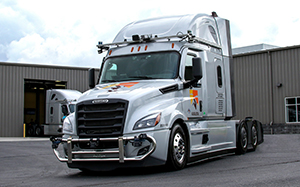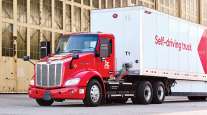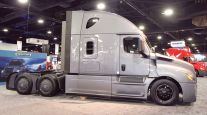Senior Reporter
Daimler, Torc Robotics See Path to Autonomous Trucking as Marathon

[Stay on top of transportation news: Get TTNews in your inbox.]
One year after Daimler Trucks purchased a majority share in U.S.-based Torc Robotics to develop Level 4 autonomous trucks, efforts have accelerated to bring out highly automated trucks within the decade, company executives said.
At the same time, they are pushing Tier 1 suppliers for even more advanced safety technologies.
Also, it was announced that Daimler’s Autonomous Technology Group will build a center in Albuquerque, N.M., to support testing and provide data for more use cases of next-generation vehicles on public roads beginning this fall.
Celebrating our one-year anniversary with @DaimlerTrucksNA by starting a new testing center in #Albuquerque, New Mexico. Together, we have marked yet another milestone in our journey to commercializing L4 automated trucks. https://t.co/vG1VnYqa94 pic.twitter.com/iSOPtYZhyg — Torc Robotics (@torcrobotics) September 3, 2020
The companies referred to their developmental effort as a marathon, not a sprint, and noted that safety milestones will dictate the exact timetable for marketing the trucks — adding they have no intention of carrying freight themselves in the eventual automated trucks or competing with Daimler customers.
As is typical with disruptive technology, plenty of challenges remain, Torc Robotics CEO Michael Fleming said during a media roundtable Sept. 1. That includes the necessary safety-focused technology that is not yet ready for commercial deployment.
“We have been engaging Tier 1 suppliers with new requirements, trying to push the envelope on radar, lidar and cameras, and also compute systems at the same time,” he said. “At the end of the day, when we bring product to market it has to be cost-effective, meet the performance specifications to address not only safety but ensuring we can drive efficiently to the destination and deliver goods in a timely fashion.
“I’ll be very direct with you. There isn’t, in my opinion, automated vehicle hardware commercially available that meets all three today.”

Daimler and Torc test trucks with SAE Level 4 intent technology on public roads in Virginia in September 2019. (Daimler Trucks and Buses)
At the same time, Fleming said, “Daimler’s commitment to safety, innovation leadership of truck technology and foundational knowledge of on-road scenarios that truckers encounter has moved our system faster than we could have done alone as a technology firm.”
SAE Level 4 is defined as when a truck operates on the road without driver input or assistance within specific areas and conditions.
“We are not a startup,” Fleming added. “In fact, we are one of the pioneers of self-driving dating back to the Darpa urban challenge of 2007. We have been safely operating on the road well before the SAE coined the different levels of automation.”
The companies envision their automated trucks will be used in a hub-to-hub application along certain routes, with human drivers leaving a distribution center and delivering the truck and its freight to a hub, from which it will be self-driving on the highway to the next hub. Then other drivers will drive it to the final distribution center.

What are fleets doing to help attract the best possible diesel technicians to join the changing workforce environment? Host Michael Freeze speaks with Ken Boyer, dean of the Auto/Diesel Institute at Baker College, and Ralph Romero, vice president of talent management at U.S. Xpress. Hear a snippet, above, and get the full program by going to RoadSigns.TTNews.com.
For its part, Daimler Trucks’ goal is to refine a truck chassis that is perfectly suited for highly automated driving and includes the redundancy of systems needed to achieve safe, reliable operation, according to the Stuttgart, Germany-based unit of Daimler Group.
Fleming said Daimler is reinventing the truck to be self-driving.
Daimler Trucks expects the adoption of self-driving trucks to be gradual and methodical, much like its experience with automated manual transmissions and its Level 2 technology.
“It will be a few fleets, big fleets involved with innovation, that will start testing this and collect experience over one or two years,” said Peter Vaughan Schmidt, head of Daimler Trucks’ Autonomous Technology Group. “And we will improve our product and add more routes. And then I think the news will spread and people will see it seems to work and try it out, too.”
Discussions with fleets are underway, Fleming said.
Meanwhile, all their automated test drives require the combination of a safety conductor overseeing the system and a highly trained safety driver, certified by Daimler Trucks and Torc, the companies said. All safety drivers hold commercial driver licenses and are specially trained in vehicle dynamics and automated systems.
Today and Tomorrow: Join NHTSA for 3 virtual events related to our AV TEST Initiative, which will include a demo of the online tracking tool developed to provide info about testing & development of automated driving systems across the U.S. For more info: https://t.co/GYpjIpc7de pic.twitter.com/7Zat38JOeZ — nhtsagov (@NHTSAgov) September 2, 2020
The announcements from Daimler and Torc came a day before the U.S. Department of Transportation unveiled an online tool that provides information about the on-road testing of automated driving systems.
The Automated Vehicle Transparency and Engagement for Safe Testing Initiative is the first platform connecting the public, manufacturers, developers, operators and all levels of government to voluntarily share information about the on-road testing and development of prototype automated-driving systems, according to DOT.
Navistar International in July announced a strategic partnership with self-driving technology company TuSimple to co-develop SAE Level 4 self-driving trucks targeted for production by 2024.
Truck makers Volvo Group and Paccar Inc. separately have reported they, too, are working to develop self-driving trucks.
Ike Robotics Inc. on Sept. 1 reached agreements with three major companies to put its technology into at least 1,000 trucks.
Want more news? Listen to today's daily briefing:
Subscribe: Apple Podcasts | Spotify | Amazon Alexa | Google Assistant | More




